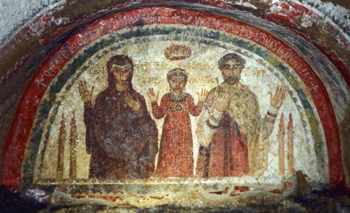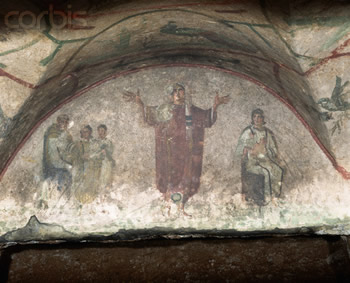"Lord, Teach Us To Pray"
Our Kids and God's Kingdom
For Sunday July 28, 2013
Lectionary Readings (Revised Common Lectionary, Year C)
Hosea 1:2–10 or Genesis 18:20–32
Psalm 85 or Psalm 138
Colossians 2:6–15 (16–19)
Luke 11:1–13
A guest essay by Joan Bigwood. Author, playwright and inspirational speaker Joan Bigwood is a descendant of too many Episcopal clerics to count, including her grandmother, Jane Cleveland Bloodgood, who was one of the first women to be ordained in the Episcopal church. This spiritual legacy informs Joan's creative work, which she believes "introduces Christ into the human story in many guises."
“Is there anyone among you who, if your child asks for a fish, will give a snake instead of a fish? Or if the child asks for an egg, will give a scorpion?"
What if your child asks to be heard? Do you listen? Or do you just nod?
What if they ask for the truth? Can you bear to tell it?
Perhaps because I see the world through the lens of a parent, the readings from both Genesis and Luke distill for me the nature of a moral education, one that extends from the very first parental correction, through the intimate conversations of long car rides and late camp fires, well into the teenage years of increasingly sophisticated debate, where what is ‘right’ versus what is convenient becomes the leitmotif of our discussions. I think the majority of parents would agree that it is much easier to teach our children how to set the table, or how to ride a bike, how to cook, or do the laundry, than it is to teach them how to be.
 |
Catacomb fresco of a family praying. |
Lord, teach us to pray. Part of us believes that, through prayer, God will grant us wishes if we ask fervently enough, but that is venturing into Santa Claus territory, isn't it? Jesus instructs his disciples by keeping it very simple: “Father, hallowed be your name. Your kingdom come. Give us each day our daily bread. And forgive us our sins, for we ourselves forgive everyone indebted to us. And do not bring us to the time of trial."
This distilled version of the Lord’s Prayer covers the basics: a daily dose of grace, forgiveness, and support in the face of temptation. It is balanced, even-handed, not too greedy, and best of all, because it takes its cue from God’s will for us, it has the Messianic Stamp of Approval. It’s also the first prayer most children learn.
Ever since my kids were old enough to talk, I would insist on their participating in the part of the service where we said the Lord’s Prayer together. Their dad has prayed it with them every night at bedtime. It’s tried and true. But it’s only the beginning. Prayer in all of its many forms and contexts is as individual as it is powerful, and it is our job to help our children find their own prayerfulness, and to use prayer as a means of making a spiritual connection with their creator, sanctifier and redeemer.
Our job as parents would be a lot easier if God were more like Santa Claus, who knows when you are bad and good, and brings wonderful gifts to all the little girls and boys. Well, there's Good News. God may not have a mailing address or a supersonic sleigh, but the Holy Spirit knows where the gifts are kept.
I went through an artistic phase in high school. This is remarkable because I had never considered myself any kind of visual artist. My sister was the gifted artist in the family. Hand-eye coordination was my forte. In fact, my mother used to say to me, as my sister turned out another snazzy outfit on her sewing machine, or a set of pen and ink notecards, “Kate is a maker, and you are a do-er.” That was not entirely true — Kate sold her notecards for charitable purposes for starters, but it was neat packaging and my mother was a very busy woman, so pithiness often trumped accuracy.
But then in high school I suddenly found myself creating my own pen and ink drawings — very different from Kate’s meticulous wildlife renderings. Mine were more cartoony — but recognizable, whimsical, and mine, all mine. I started to dabble in different media, one day seizing upon an image that I wanted to create out of cut paper: a starry night sky with a gigantic zipper unzipping to reveal a rainbow. I wrote at the bottom of the page “Seek and Ye shall Find.” I framed it and gave it to my mother, who displayed it in her office at the Yale Divinity School for the next ten or more years. So it turned out I was an artist after all!
This unzipped rainbow was an early attempt to express a still unformed belief, and even if crudely rendered, the message was an important one. If you look hard enough, my piece of art said, and I wanted so badly to believe, that if you really go beyond what is before you, you will find what you are looking for. In this case, a rainbow. These were the 1970’s, after all. But how strongly I wanted to believe at that burgeoning time in my life that there was a giant cosmic zipper one could simply pull, behind which lay one’s every dazzling dream. Seek and ye shall find.
Since then, I have adjusted my thinking somewhat. I have refined my beliefs on the topic of seeking, perhaps because I have spent the past 30 years since my rainbow oeuvre seeking things I could not actually find, no matter how hard I sought: critical success in my dream career, a long and happy marriage, a firstborn who survives infancy. We are not prepared for the setbacks that await us, especially those of us who believe that if we ask, it will be granted us.
Luke writes, “Ask, and it will be given you; search, and you will find; knock, and the door will be opened for you. For everyone who asks receives, and everyone who searches finds, and for everyone who knocks, the door will be opened.”
 |
Early fresco of woman at prayer. |
But look carefully at how this is worded. Everyone who asks receives. It doesn’t say, "Everyone who asks receives it." In fact, it is very likely that the opposite is true: what I ask for as a limited mortal, with so many unchecked impulses and earth-bound longings, is probably not what I will receive. Because what I want is rarely what I ought to have. I am of the tribe that believes that if I have fame and fortune, for example, I have success. That just because I saw stars when I met my husband-to-be, we would live compatibly until death us did part. That I would not be able to survive the death of a child, so please Lord, don’t let anything happen to her.
As a Sunday School teacher, I have had the pleasure at Pentecost of helping children learn about the gifts of the Spirit, and to wonder at their own, individual gifts that make them unique. We read aloud examples of different kinds of gifts of the Spirit and how they might apply to real-life situations. The idea is for the children to recognize themselves in the various scenarios and then to express artistically what their own gift might be. By the end of our time together, we have identified everything from Helpers to Players.
It is a revelatory exercise and an affirming one. Yet, this early discernment process is only the beginning. More gifts will come to light, new gifts, special gifts. I have discovered my gift for teaching, for directing, for singing Karaoke. And the best gifts of all may come in the face of terrible setbacks: I have often wondered if, in giving up one of my own children, having to say goodbye to someone loved so completely, I would be able to let go of things I love with more equanimity. That would certainly be a great gift because life is riddled with goodbyes.
But what about this promise of the Holy Spirit to those who ask?
“If you then, who are evil, know how to give good gifts to your children, how much more will the heavenly Father give the Holy Spirit to those who ask him!"
Let’s not get too hung up on the use of the term evil here — I believe it is used merely to distinguish between sinners and saviors, between the human and divine. And from Genesis we have seen in Abraham’s obsequious cross-examination that God is willing to bargain when it comes to salvation ("For the sake of ten I will not destroy [Sodom].")
The key is not so much to ask for the gift as it is to trust in divine grace. The key is to seek, knowing not at all what we might find. It is to have faith that we will find something, most likely something surprising, and that it will be good.
Image credits: (1) Wikimedia.org and (2) CorbisImages.com.





